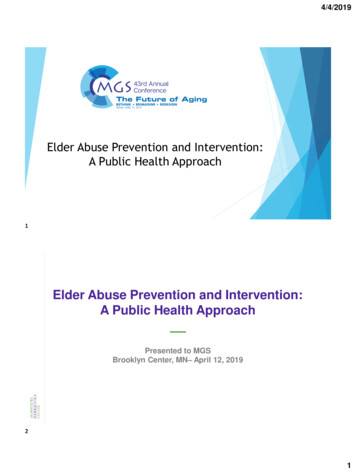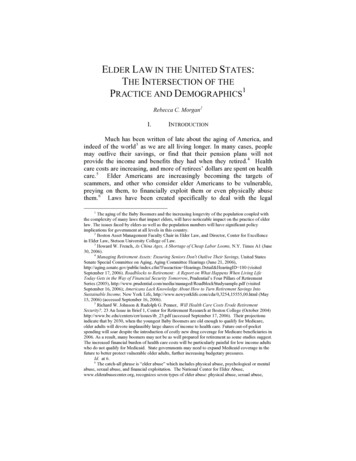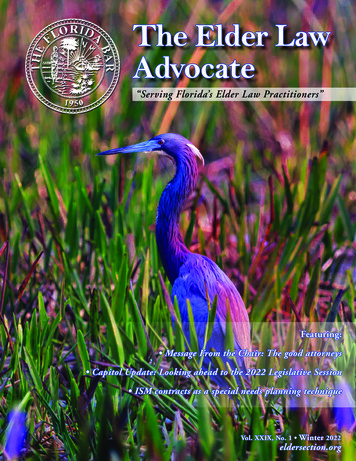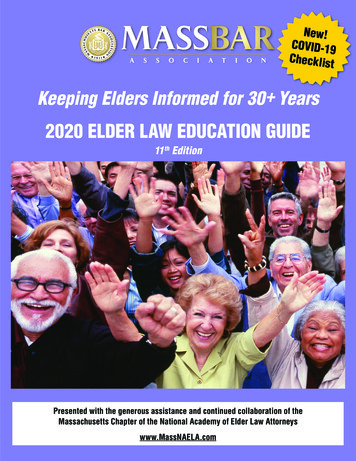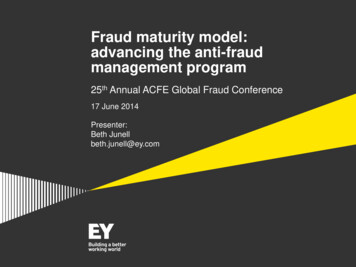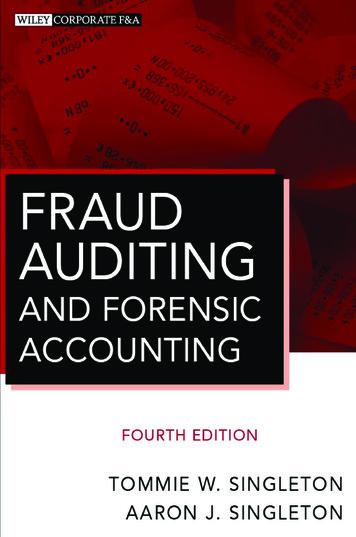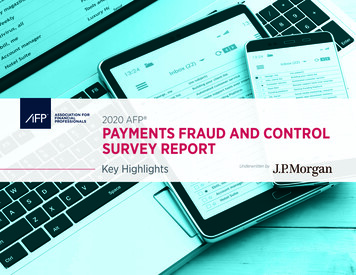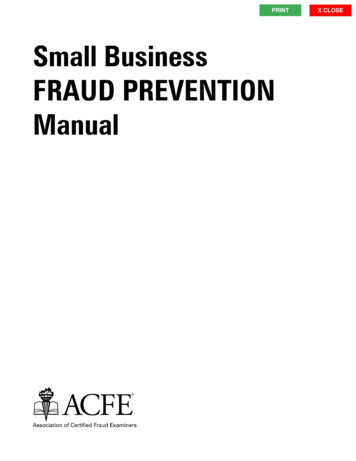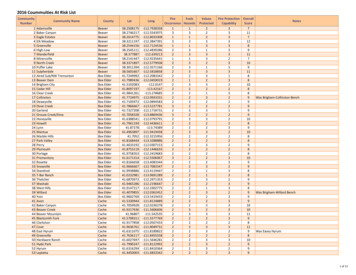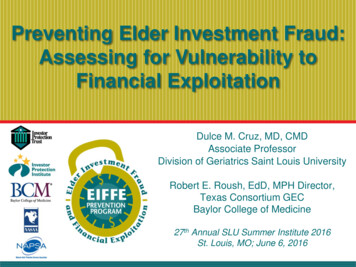
Transcription
Preventing Elder Investment Fraud:Assessing for Vulnerability toFinancial ExploitationDulce M. Cruz, MD, CMDAssociate ProfessorDivision of Geriatrics Saint Louis UniversityRobert E. Roush, EdD, MPH Director,Texas Consortium GECBaylor College of Medicine27th Annual SLU Summer Institute 2016St. Louis, MO; June 6, 2016
Disclosure The presenter discloses that he receivedfederal funding from HRSA’s GeriatricsEducation Centers Program. Dr. Roushfurther discloses grant funding from thenon-profit Investor Protection Institute. Development of the Clinician PocketGuide was made solely by members ofthe Baylor College of Medicine faculty.
EIFFE Prevention Learning Objectives List key factors that increase an older person’svulnerability to elder investment fraud andfinancial exploitation (EIFFE). Describe common financial exploitationschemes and practices. Determine when to and where to refer patientsdeemed high risk to appropriate sources ofassistance.
Pre-Test QuestionWhich of the following conditions can contribute tosome older people being financially exploited?a. Parkinson’s diseaseb. Damage to the prefrontal cortex of the brainc. Mild Cognitive Impairmentd. Recent death of spousee. All the above
Fraud Can Happen to Any of Us“To those seniors and especially elderly veterans like myself, Iwant to tell you this: You are not alone and you have nothingto be ashamed of. If elder abuse happened to me,it can happen to anyone.”Mickey RooneyTestimony to Senate Special Committee on Aging, March 2, 2011
CLINICAL QUESTIONS: OUTLINE What risk factors and clinical clues areassociated with financial exploitation? How is an assessment of an individual’s financialdecision-making capacity performed andappropriately documented? What is the healthcare provider’s role in thisissue? If detected what is next?
Epidemiology of Elder Abuse Of all elder abuse cases reported, 30% were forfinancial exploitation(National Elder Abuse Study, 1998) Two nationally representative studies found4-5% of older adults in the US have beenvictims of financial abuse(Acierno et al., 2010; Laumann et al., 2008; Peterson 2014)–similar prevalence to heart attacks and higher than systolic heartfailure (1-2%). Increases mortality, SNF and hospital DiseaseStrokeStatistics.pdf. Dong X. JAMA 2013)
Evidence Supporting EIFFE 35% of persons 71 y/o and older have Mild CognitiveImpairment (MCI) or full dementia (Plassman 2008). Persons with MCI make four times the financial errorsthan those without the condition (Marson 2009). Elders losing significant amounts don't have the timeto recoup losses.
Evidence Supporting EIFFE If losses are significant, forcing choices betweenout-of-pocket health care costs & routine livingexpenses, this can become a clinical issue(Widera 2011) Elders with depression and substance abuse areat increase risk for Financial Adults/Press-Release.aspx: Accessed 03/08/2013)
Important Definitions Vulnerable Older Adults: those who demonstratecharacteristics/perform behaviors associated withsubsequent morbidity, disability, or death Financial Capacity: “ability to make and executedecisions consistent with personal preferences andvalues regarding finances”Wenger, NS et al: Annals of Internal Medicine: 2001 and Saliba, D: Journal of AmericanGeriatrics Society: 2001Marson, D et al: Encyclopedia of Psychology and the Law: 2008
Important Definitions Investment Fraud and Financial Exploitation:“The illegal or improper use of another individual’sresources for personal profit or gain” Undue Influence: “When exploiters, whether family,acquaintances, or strangers, use their power todeceptively gain control over the decision making ofa victim. Often involves financial exploitation.”Adult Protective Services: http://www.ncea.aoa.gov/NCEAroot/Main Site/FAQ/Basics/Types Of Abuse.aspxAmerican Bar Assoc. & American Psychological Assoc. Assessment of Older Adults with DiminishedCapacity: A Handbook for Psychologists: 2008
Case Scenario 1 Mr. Allen is an 83-year-old man who lacksfinancial capacity due to Mild CognitiveImpairment (MCI). Mr. Allen has involved hisson Steven in some financial decisions. WhileMr. Allen is a conservative investor, Stevenlikes to take risks. He invests a large portion ofhis father’s retirement funds in a risky stock.Soon afterwards, the stock falls dramatically.Out of embarrassment, Steven doesn’t tell hisfather what he has done. (Is this fraud?)
Case Scenario 2 Mrs. Hartford is an 86-year-old recent widow. Herdaughter, Mae, hires a caregiver, Susan, to helparound the house. Mae notices that Susan isacquiring lots of new things. Then Mae discovers shecannot access her mother’s accounts anymore. Shevisits her mother; Susan is no where to be found. Susan had unduly influenced Mrs. Hartford intosigning a durable power of attorney. She thendepleted Mrs. Hartford’s retirement funds. Once Maerealized what was happening, Susan took what wasleft of Mrs. Hartford’s savings and fled. (Is thisfraud?)
CLINICAL QUESTIONS: OUTLINE What risk factors and clinical clues areassociated with financial exploitation? How is an assessment of an individual’s financialdecision-making capacity performed andappropriately documented? What is the healthcare provider’s role in thisissue? If detected what is next?
What you can do to prevent EIFFE Educate about need for advance financial planning Simple office-based assessments of potentialvulnerability to EIFFE– checklist of situations associated with high risk– assessment questions– referral sources for those deemed potentially athigh risk(E. Widera et al. JAMA, Feb. 16, 2011)
ClinicalAssessment ofVulnerable OlderAdults Add questions topatient’s waitingroom paperwork Assess duringoffice visit usingClinician’sPocket Guide
Red Flags in Patient/Client History Social isolationBereavementDependence on another to provide careFinancially responsible for adult child orspouse Alcohol or drug abuse Depression or mental illness
Red Flags from Clinical Observation Change in ability to perform activities of dailyliving, including self care, daily finances,medication management Accompanied by caregiver who is overlyprotective; dominates patient/client Change in appearance, poor hygiene
Use EIFFE Prevention MaterialsClinician’s Pocket GuidePatient Education BrochureSee EIFFE program materials at this web ies/?fa eiffe-pp
“When Abuse of OlderPatients Is Financial”New York TimesMarch 2, 2011Elizabeth Olson’s story aboutRobert Parker, MD, who took aCME course on EIFFE in SanAntonio in 2009, and how heuses the Clinician’s PocketGuide to screen his patients.(Photo used by permission fromLisa Krantz for the NY Times.)
Introducing the Issue to Your Patient “We find that some older adults worry aboutmoney; may I ask you a few questions aboutthis?” or “I just read a NY Times article about eldersbeing financially exploited and thought Iought to talk to my mother and my patients,too.” What other opening questions do youthink would be good ones?
Questions You Can Ask (1) Who manages your money day today? How is that going? Do you run out of money at the endof the month?
Questions You Can Ask (2) Do you regret or worry about financialdecisions you’ve recently made? Have you given power of attorney toanother person? Do you have a will? Has anyone askedyou to change it?
Tools You Can Use Rapid cognitive screen, 5-item recall, clockdrawing test and short story (short SLUMS) Mini-Cog – 3-minute, three-item recall andclock-drawing test as an informational distractor Montreal cognitive assessment (MoCA) testscore 26Borson S. The mini-cog: a cognitive “vital signs” measure for dementia screening in multi-lingual elderly. Int JGeriatr Psychiatry 2000; 15(11):1021.Malmstorm TK et al. The Rapid Cognitive Screen (RCS): A Point-of-Care Screening for Dementia and MildCognitive Impairment.J Nutr Health Aging. 2015;19(7):741-4.
Tools You Can Use (2) Financial Capacity Instrument (FCI)* FCI-9 consists of 20 financial tasks, 9 domains of financialactivity, and 2 global levels. Discriminates well between cognitively intact older adultsand persons with mild and moderate Alzheimer's disease. Sensitive to identifying subtler changes in the financialabilities of individuals with Mild Cognitive Impairment.*Contact Daniel C. Marson, PhD, JD, Dept. of Neurology, University of Alabama, Birminghamdmarson@uab.edu. 25.xml
CLINICAL QUESTIONS: OUTLINE What risk factors and clinical clues areassociated with financial exploitation? How is an assessment of an individual’s financialdecision-making capacity performed andappropriately documented? What is the healthcare provider’s role in thisissue? If detected what is next?
What types of referral may beneeded? (1) Further medical evaluation– needs assessment for cognitive,neurological, or other conditions Help with managing money or other caretasks– poor resource management or limitedresources available; needs assistancewith finances, meals, transportation, ADLs
What types of referral may beneeded? (2) Fraud and exploitation may haveoccurred– needs case reported to appropriateauthorities Legal advice or protection– needs assistance with financial planningor legal documentation
Responsible Party Characteristics Traits– caregiver– male, usually relative– living with the patient– economically dependent on the patient– history of mental illness, including substance abuseand antisocial behavior or other health problemsTueth, M (Am J Geriatr Psychiatry 8:2, Spring 2000)
Interactions with Responsible Party Observe for following behaviors:– demeaning comments about the patient– defensive, suspicious attitude– hostility about your inquiries– threat to change doctorsTueth, M (Am J Geriatr Psychiatry 8:2, Spring 2000)
Referral Sources in Your State Find your state’s APS contact information http://www.apsnetwork.org/Abuse/index.htmlLocate your State Securities Regulator –NorthAmerican Administrators Associationwww.nasaa.orgUnited Way – 211 local hotlinewww.211.orgNational Association of Professional Geriatric CareManagers www.caremanager.orgNational Academy of Elder Law Attorneyswww.naela.org
Immunize Your Patients fromMaking Bad Financial Decisions Chapters 17 and 18 ingeriatrician Mark Lachs’book deal with agingand money issues. Citing works like thishelps patients and theircaregivers appreciateyour concerns.
New Book on EIFFE Book edited by Ronan Factora, MD, ClevelandClinic – Chapter by R. Roush and A. Naik
TAKE HOME MESSAGE Elders with cognitive impairment are at increased risk for financial abuseEducation of family and patients about advancefinancial planning is crucial Assessment can be done with simple questions and observationsWhen suspect of financial abuse refer to socialworker and respected agencies
References1. Acierno R. et al. Prevalence and correlates of emotional, physical, sexual, and financialabuse and potential neglect in the United States: The National Elder Mistreatment Study.”Am J Pub Health 2010;100(2): 292-297.2. Bartels SJ, Naslund JA. The underside of the silver tsunami – older adults and mentalhealth care. N Engl J Med. 2013;368:493-496.3. Denburg NL et. al. The orbitofrontal cortex, real-world decision-making, and normalaging. Ann NY Acad Sc 2007:1121: 480-498.4. Marson DC et al. Clinical interview assessment of financial capacity in older adults withmild cognitive impairment and dementia.” J Am Geriatr Soc 2009;57:806-814.5. Plassman BL, Langa KM, Fisher GG, Heeringa SG, Weir DR, Ofstedal MB, et al.Prevalence of cognitive impairment without dementia in the United States,” Ann Intern Med2008 March 18;148 (6):427–34.6. Roush RE, Moye, JA, Mills WL, Kunik ME, Wilson NL, Taffet, GE, Naik AD. Why cliniciansneed to know about the elder investment fraud and financial exploitation program,Generations 2012 Summer; 36(2):94-97.7. Tueth, M. Am J Geriatr Psychiatry 2000 Spring;8:2.8. Widera E, Steenpass V, Marson, DC, Sudore R. Finances in the older patient withcognitive impairment: He didn't want me to take over. J Am Med Assoc 2011;305(7):698706.
Acknowledgements of Project Team Bob Roush, EdD, MPH, Principal InvestigatorAanand Naik, MD, Co-PIGeorge Taffet, MD, Chair, Internal Advisory GroupLarry McCullough, PhD, Member, IAGNancy Wilson, LMSW, Member, IAGMark Kunik, MD, Member, IAGWhitney Mills, PhD, & Justin Wheeler, Assistant Project DirectorsElisa Rodriguez and Kristin Cassidy, Former Assistant Project DirectorsJennifer Moye, PhD, Elder Capacity Assessment ConsultantJanet Pinner, RN, PGCM, Nursing Continuing EducationWayne Howell, JD, Investor Education ConsultantThe physicians, nurses, social workers and investor educators infocus groups whose opinions and suggestions guided our efforts
Contact Information Bob Roush, EdD, MPH, Huffington Center on Aging,Baylor College of Medicine, Houston, Texasrroush@bcm.edu Aanand Naik, MD, Houston Health Services Research &Development Center of Excellence at the Michael E.DeBakey VA Medical Center anaik@bcm.edu Don Blandin, MPA, President and CEOInvestor Protection Trust/Investor Protection Instituteblandin@investorprotection.org;
Investment Fraud Affects EveryoneIn the United States,BILLIONS of dollars arelost each year toinvestment fraud andscams.These scams affect boththe rich and poor; thesophisticated and theunsophisticated; thetimid, the greedy,and the elderly.
Of all elder abuse cases reported, 30% were for financial exploitation (National Elder Abuse Study, 1998) Two nationally representative studies found 4-5% of older adults in the US have been victims of financial abuse (Acierno et al., 2010; Laumann et al., 2008; Peterson 2014) - similar prevalence to heart attacks and higher than systolic .
